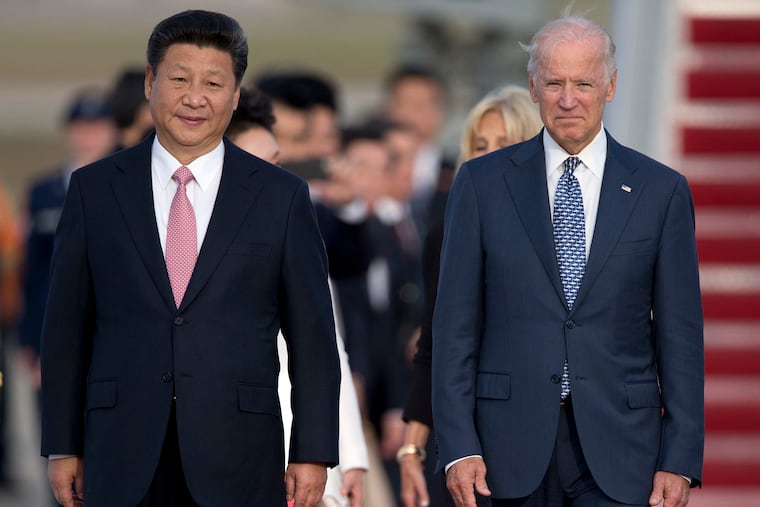Biden’s economic plan is vital for competing with China — and for U.S. self-respect | Trudy Rubin
A bigger U.S. government role is vital for the U.S. to catch up with China in infrastructure, critical research and scientific education.

Although President Biden barely mentioned foreign policy in his address to Congress on Wednesday, it was really a foreign-policy speech.
In laying out a multitrillion-dollar plan to invest in infrastructure, education, basic research, and the workforce, there was an underlying theme that may have eluded many listeners.
“We’re in competition with China and other countries to win the 21st century,” Biden said. “We have to compete more strenuously than we have.” He also said, “We have to prove democracy still works, that our government still works and can deliver for the people.”
Indeed, America’s paramount foreign-policy challenge in this century will be to demonstrate that our damaged democracy is capable of competing with an authoritarian China — a self-confident China that believes it is destined to set the global rules in coming decades.
And the key to that competition, rather than revolving around which country has the strongest military, will depend on whether America can rejuvenate itself at home.
» READ MORE: Biden's infrastructure plan is key to competition with China I Trudy Rubin
Many Americans, secure in their belief that this country is the greatest, have failed to grasp how far we have fallen from global leadership in critical areas, where we should still have the lead. However, the rest of the world clearly sees this, including Chinese leaders.
Our infrastructure – airports, bridges, tunnels, roads, electrical grids, and broadband internet – is a crumbling disgrace. In its 2021 report card, the American Society of Civil Engineers gave U.S. infrastructure a C-.
A few of the problems it cited include water-main breaks every two minutes, failing levees, inadequate airports, structurally deficient bridges, badly aging roads — and woefully insufficient internet coverage. During the pandemic lockdowns in 2020 and 2021, an estimated 20% of school-aged children lacked the high-speed connection needed to access lessons. And one-third of rural areas lack coverage.
Foreigners confront U.S. dysfunction from the moment they step foot in New York City’s awful John F. Kennedy Airport, and travel to the city. I still recall a Chinese official telling me how his teenage son recoiled the first time he traveled on a New York subway, asking his father, “Why do Americans put up with such filthy trains?”
Why, indeed. Why have Americans come to accept this as normal? Chinese people travel via shiny new airports, even in small cities, and they move from city to city on 23,000 miles of excellent high-speed railways. Even the most remote towns have internet service.
Does this mean an authoritarian system is better than ours because it “makes the trains run on time”? Not at all.
But it does mean that Americans have lost sight of what government can do for the people, after decades of being told that government was bad for them. They have forgotten that President Dwight Eisenhower signed legislation funding the building of our interstate highway system.
Americans have also forgotten the “Sputnik moment” after the Soviet Union launched the first Earth-orbiting satellite in 1957. This led to the creation of NASA, along with massive government funding for improving science and mathematics education. Government funding was also key to the birth of the internet.
As Biden proposed, it’s vital that Washington rise to the occasion again.
Yet, federal spending on basic research and development, which used to equal 2% of GDP, has been steadily falling. In fiscal year 2019, it declined to 0.6% of U.S. GDP, the lowest in more than 60 years.
As Biden made clear, that figure has to rise.
America’s vital research and development needs can’t be met by the self-interested gods of Silicon Valley. This is a moment in history where advances in cutting-edge technologies will determine whether China rules the global economy along with space and military competition. Washington must help.
» READ MORE: The gloves came off in Alaska for US-China competition. What comes next? I Trudy Rubin
Many of Biden’s social proposals, including government-funded preschool, free community college, and workforce development, are an investment in the human capital needed to compete with China. Did you know that, in international rankings, U.S. 15-year-olds poll 11th in science and 30th in math? Guess who polls first? Yes, it is China.
“China and other countries are closing in fast,” Biden rightly said on Wednesday night. America must “develop and dominate the products of the future. Advanced batteries, biotechnology, computer chips, clean energy,” and more.
This competition isn’t about who can beat their chest and claim global superiority. It is about whether U.S. democracy can demonstrate that our system surpasses autocracy in providing for its own people, and leading the world scientifically.
Back in December, when America’s handling of COVID-19 was among the world’s worst, Chinese newspapers crowed about U.S. failures. After the Jan. 6 insurrection, even allied nations wondered if a dysfunctional America was self-destructing.
Today, the White House success with vaccinations has proven America can rise to the occasion (although continued GOP propagation of the big election lie undermines that progress).
So, whatever the debate over specifics or funding of Biden’s proposals, Americans should pay attention to the underlying message: In the 21st century, U.S. democracy faces critical competition from China’s autocracy. To win that race Americans need their federal government to renew its historic role.